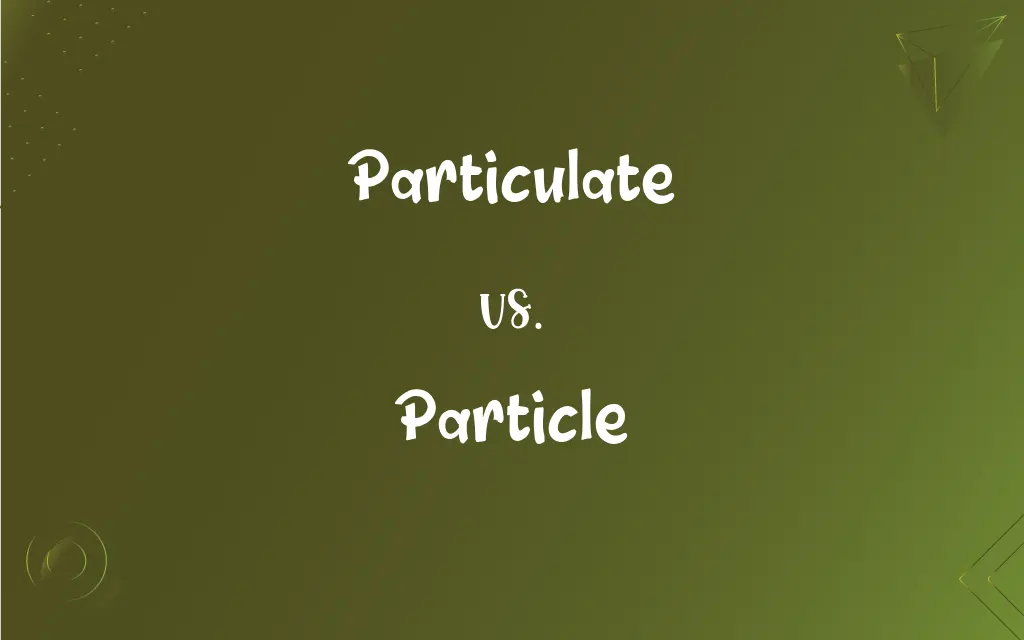Particulate vs. Particle: What's the Difference?
Edited by Aimie Carlson || By Harlon Moss || Updated on November 3, 2023
Particulate is an adjective or noun for small solid or liquid particles in air or water; particle is a noun for a small piece of matter.

Key Differences
Particulate refers to the physical form of small particles that can be solid or liquid suspended in a gas or liquid. It is used both as an adjective and a noun, often in environmental science to discuss pollutants. The term "particulate matter" encompasses a variety of particles of different sizes and compositions. In contrast, the term particle is more general and refers to a small piece of anything, such as solids, liquids, or gases. Particle is used in various fields, from physics to environmental science, to indicate a small constituent unit.
While particulate is specifically related to environmental science and pollution, indicating a discrete packet of matter, usually airborne or in water, particle is broader and not limited to environmental contexts. A particle can be an atom, a molecule, or any small piece of matter. The particulate is a subset within the category of particles, usually referring to those small enough to be suspended in a medium like air or water.
The specificity of particulate comes into play in discussions about air quality, where particulate matter can have health implications. For example, "particulate pollution" is a common concern in urban areas. Particle, on the other hand, is used to discuss various concepts in physics, like particles of light (photons) or elementary particles in particle physics. Thus, while all particulates are particles, not all particles qualify as particulates.
Particulate, in its usage, often accompanies words like 'matter' to form a technical term 'particulate matter' (PM), which is categorized by size, such as PM2.5 or PM10, referring to particulates with diameters less than 2.5 and 10 micrometers, respectively. In contrast, particle does not necessarily imply a measurement or a specific type but is a more general term for a small piece of matter. One can talk about a particle of dust or a particle of sand, which can also be considered particulates if contextually they are suspended in the air.
The adjectival use of particulate modifies nouns to describe the presence of particles within something (e.g., particulate filter), whereas particle does not have an adjectival form. It is purely a noun, leaving its modifiers to be descriptive adjectives (e.g., elementary particle). This linguistic difference reflects their distinct uses in communication. Particulate implies a specific concern with small, often microscopic, elements within a larger context, whereas particle serves as a more general term for discrete pieces of matter.
ADVERTISEMENT
Comparison Chart
Grammatical Use
Adjective/Noun
Noun only
Size Reference
Often refers to microscopic size
Can refer to any small size
Common Contexts
Environmental science, pollution
Physics, general science
Specificity
Specific (airborne or waterborne matter)
General (any small piece of matter)
Example
"Particulate filters trap pollutants."
"A dust particle settled on the lens."
ADVERTISEMENT
Particulate and Particle Definitions
Particulate
Descriptive of particles as a pollutant.
Particulate levels increase when more vehicles are on the road.
Particle
The smallest piece of a substance that retains its properties.
A particle of gold was found in the pan.
Particulate
Airborne particles.
The factory installed new equipment to reduce particulate.
Particle
A physical constituent of the universe.
Particle physics studies the fundamental constituents of matter.
Particulate
Relating to fine particles.
The particulate matter in the air was visible in the sunlight.
Particle
A small constituent component of a larger whole.
A particle of truth is in every myth.
Particulate
Tiny pieces of solid or liquid matter.
A high level of particulate in the factory's emissions was recorded.
Particle
A minute portion of matter.
A single particle of dust can trigger her allergy.
Particulate
Indicative of divided matter.
The particulate nature of the spray made it easy to inhale.
Particle
A fragment or a small bit.
Each particle of sand is unique.
Particulate
Of, relating to, or formed of minute separate particles.
Particle
A very small piece or part; a tiny portion or speck.
Particulate
A minute separate particle, as of a granular substance or powder.
Particle
A very small or the smallest possible amount, trace, or degree
Not a particle of doubt.
FAQs
How is the word particulate used in a sentence?
"The air filter removes harmful particulate from the air."
Is particulate always harmful?
Particulate can be harmful, especially fine particulates in the air that can be inhaled and affect health.
Can particulate be a gas?
No, particulate is particulate matter, which is solid or liquid, not gaseous.
What is a particle?
A particle is a small piece of matter, which can be a solid, liquid, or gas.
Is a particle smaller than a particulate?
Size is not the distinguishing factor; it’s about context. Particulates are specifically small particles in environmental contexts.
Is there a difference between particulate and particulates?
No, 'particulate' can be singular or plural, but 'particulates' is explicitly plural.
Do filters for particulate also capture particles?
Yes, filters designed for particulate matter also capture particles, since particulates are a subset of particles.
Is smoke considered a particulate?
Yes, smoke contains particulates, which are small, suspended particles.
What does particulate mean?
Particulate refers to a tiny piece of solid or liquid matter, often found suspended in a gas or liquid.
Are all particles considered particulate?
No, not all particles are considered particulates; particulates are specific types of small, often microscopic, particles.
Is 'particulate' ever used outside of science?
It's primarily a scientific term but may be used in general language to describe small, dispersed materials.
Do all particulates have a negative impact on health?
Many do, especially those small enough to be inhaled, but not all particulates are hazardous.
Are particulates visible to the naked eye?
Some particulates are visible, like dust, but others, like PM2.5, are not.
How are particles related to atoms?
Atoms are a type of particle, specifically the basic unit of a chemical element.
What do we call a collection of particles?
It can be called a cluster, array, or group, depending on the context.
Can 'particle' refer to a person or idea?
Metaphorically, yes, such as "a particle of doubt."
Are particulates always solid?
No, particulates can be solid or liquid, such as droplets in mist.
Can the term particulate be used for liquids?
Yes, if referring to small droplets suspended in a gas or other liquid.
Can a particle exist in a vacuum?
Yes, a particle can exist in a vacuum, as it is a small piece of matter.
What is particle physics?
Particle physics is the branch of physics that studies the fundamental constituents of matter and radiation.
About Author
Written by
Harlon MossHarlon is a seasoned quality moderator and accomplished content writer for Difference Wiki. An alumnus of the prestigious University of California, he earned his degree in Computer Science. Leveraging his academic background, Harlon brings a meticulous and informed perspective to his work, ensuring content accuracy and excellence.
Edited by
Aimie CarlsonAimie Carlson, holding a master's degree in English literature, is a fervent English language enthusiast. She lends her writing talents to Difference Wiki, a prominent website that specializes in comparisons, offering readers insightful analyses that both captivate and inform.
































































